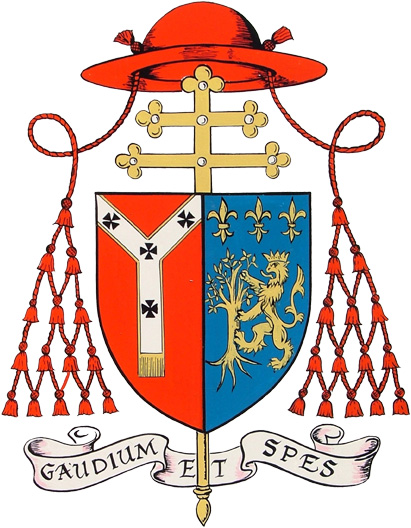by Bishop Mark Santer
I remember Cormac Murphy-O’Connor as above all a wonderful friend. On the evening of the day of his death one of my daughters rang and said how sorry she had been when she heard the news of the death of my ‘friend’. She remembered him as the nicest of the people who used to come and stay at our house (when we used one another’s houses for meetings of ARCIC drafting committees). Her memory was of a man who enjoyed family life and who was at ease with teenagers and children.
I remember him too as a friend who came all the way from Sussex to Birmingham to be present at the funeral of my wife Henriette in 1994.
I start with Cormac’s friendship because, through the seventeen years during which he and I worked together as Co-Chairmen of ARCIC-II, I came to see friendship and mutual trust as an indispensible foundation for fruitful ecumenical work. Cormac’s good humour, generosity of spirit and emotional intelligence helped the members of the Commission to trust one another, to speak frankly and honestly with each other, so as to be able to work together constructively towards the articulation of a shared Christian and Catholic faith. Friendship in Christ, expressed in the daily sharing of prayer and food was the context of our work. At the centre of it all was the daily celebration of the eucharist, with its sharp sense of separation within deeper communion.
We began our work in 1983 at a time when for many people hopes were high for growth in reconciliation between the churches. During the following years enthusiasm for our kind of work waned on all sides. But Cormac always kept his eye on the long-term hope, seeing the work that we were doing as something to be banked for use in future years. And if anyone is responsible at the human level for the quality of friendship and trust that now exists between the bishops of our two churches in England, it is he.
Cormac was a churchman rather than a theologian. He respected the crucial role of theologians. But he understood that what in the end is at stake is the reconciliation not of theologies but of divided Christian people. His primary skills lay in his acute understanding of human and institutional relationships. In many ways he reminded me of my own mentor Archbishop Robert Runcie, who used to say that nobody without a sense of humour should be put in charge of anything. Cormac certainly passed that test. He was shrewd in his judgements, but always generous. He observed and enjoyed the quirks of human behaviour, but never unkindly. He did not put people down. Rather, he encouraged them. Totally loyal to the Church, he was anything but an anxious traditionalist. A natural conservatism, if such it was, was tempered by a sense of proportion, generosity and pastoral realism. He was one for whom institutions and laws exist for the good of human beings, and not the other way round.
Cormac was born and nurtured in the old world of pre-conciliar Roman Catholicism. As a young priest he lived through and welcomed the work of the Second Vatican Council, to whose legacy he was wholly committed. As a bishop and archbishop he played a crucial role in bringing the Catholic Church into the mainstream of English life. He was never patronising. He accepted and welcomed his fellow-Christians in the common task of witnessing to the Gospel in the public space. Without any disloyalty to the faith he had received and which he was committed to uphold, he knew that the road to unity would require change in the Catholic Church as well as in others.
I finish with three memories. The first is of the day when he and I together welcomed Pope John Paul II to share prayers in the church and a meal in the refectory of Palazzola with the members of ARCIC-II. A marble plaque with our names on it commemorates the day.
Secondly there was the day when he and I, together with the two Co-Secretaries of ARCIC, went to meet the Cardinal Prefect of the Congregation of the Doctrine of the Faith (Cardinal Jozef Ratzinger) to discuss what we saw as the CDF’s unhelpful response to our Agreed Statement on Salvation and the Church. I found myself having a constructive conversation with Cardinal Ratzinger on the nature of dogmatic statements; I felt myself in the presence of a German professor of theology with whom I shared a common world of theological discourse. His underlings were less happy. As we left the meeting, one of them said to Cormac and the Catholic Co-Secretary, ‘Next time you come, send us the questions seven days in advance’.
My third memory is of the visit that he and I paid together in May 2016 to a meeting of ARCIC-III, assembled again in Palazzola. They made us enormously welcome. But what I remember above all is lunch one day with Cormac on the terrace of a restaurant in Castel Gandolfo, looking out over Lake Albano: a little foretaste of the heavenly banquet in which we all hope to share together.
To quote the apostle: Cormac, I thank my God upon every remembrance of you.




